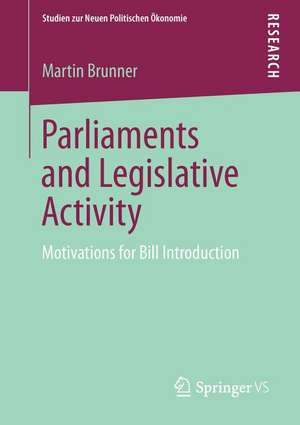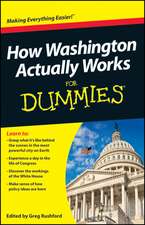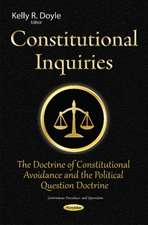Parliaments and Legislative Activity: Motivations for Bill Introduction: Studien zur Neuen Politischen Ökonomie
Autor Martin Brunneren Limba Engleză Paperback – 10 oct 2012
Preț: 380.07 lei
Nou
Puncte Express: 570
Preț estimativ în valută:
72.72€ • 76.14$ • 60.18£
72.72€ • 76.14$ • 60.18£
Carte tipărită la comandă
Livrare economică 05-19 aprilie
Preluare comenzi: 021 569.72.76
Specificații
ISBN-13: 9783531196114
ISBN-10: 3531196111
Pagini: 172
Ilustrații: VII, 164 p. 13 illus.
Dimensiuni: 148 x 210 x 9 mm
Greutate: 0.23 kg
Ediția:2013
Editura: Springer Fachmedien Wiesbaden
Colecția Springer VS
Seria Studien zur Neuen Politischen Ökonomie
Locul publicării:Wiesbaden, Germany
ISBN-10: 3531196111
Pagini: 172
Ilustrații: VII, 164 p. 13 illus.
Dimensiuni: 148 x 210 x 9 mm
Greutate: 0.23 kg
Ediția:2013
Editura: Springer Fachmedien Wiesbaden
Colecția Springer VS
Seria Studien zur Neuen Politischen Ökonomie
Locul publicării:Wiesbaden, Germany
Public țintă
ResearchCuprins
The Puzzle of Parliamentary Bill Introduction.- Parliamentary Bills as Party Policy Signals.- Public Opinion and Parliamentary Activities.- Private Members’ Bills between Party and Constituency.
Notă biografică
Martin Brunner is currently working as a researcher at the Department of Political Science, University of Mannheim.
Textul de pe ultima copertă
Martin Brunner aims at solving the puzzle of why opposition parties or government backbenchers propose legislation even though the chance to influence policy outcomes in this manner is almost nil. He argues that instead of influencing policies directly most parliamentary bills serve different purposes: They are used in order to signal own policy positions and to show alternatives to government policies. Or they point at topics that rank high on the public agenda but low on the government agenda. They can also be a means for individual Members of Parliament to build up an independent personal profile. Using formal models and comparative empirical evidence from Belgium, France, Germany, and the United Kingdom the author shows that parliamentary initiatives of opposition and backbenchers are not simply “much ado about nothing”, but the result of vote-seeking motivations.
Table of contents
The Puzzle of Parliamentary Bill Introduction.- Parliamentary Bills as Party Policy Signals.- Public Opinion and Parliamentary Activities.- Private Members’ Bills between Party and Constituency.
Zielgruppen
- Researchers in the field of political science
- Members of Parliament
Table of contents
The Puzzle of Parliamentary Bill Introduction.- Parliamentary Bills as Party Policy Signals.- Public Opinion and Parliamentary Activities.- Private Members’ Bills between Party and Constituency.
Zielgruppen
- Researchers in the field of political science
- Members of Parliament
Caracteristici
Publication in the field of social sciences Includes supplementary material: sn.pub/extras

















